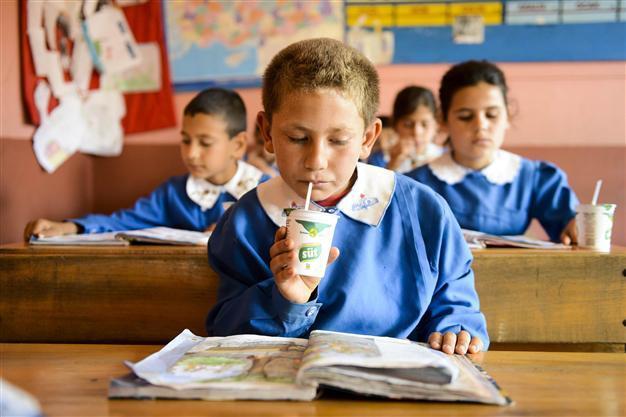Turkey not milk drinking nation
ISTANBUL- Hürriyet Daily News

The project to distribute milk to 7.2 million Turkish students not only benefits the children, but also Turkish milk producers, says Ali Koyuncu, head of the Turkish Milk Producers Union. Turkey lags in milk consumption.
Of the world’s 703 million-ton supply of milk products, Turkey produces 11.6 million tons, according to the World Milk Situation (DSD) report, and the country is 15th in the world in terms of milk production, according to Ali Koyuncu, the head of the Turkish Milk Producers Union. Turkey is currently head-to-head with Ukraine in terms of milk production, but it has a very long road ahead when it comes to increasing domestic milk consumption.
On a per-capita basis, Turks consume 25 liters of milk annually, compared to 75 liters in the EU and 95 liters in the U.S., Koyuncu said.
“We need to make a greater effort to increase milk consumption in Turkey. To that end, the project to distribute milk to 7.2 million Turkish students has been a big help, both to milk producers and the general public. I believe this project should definitely continue next year,” Koyuncu said, speaking in a telephone interview with the Hürriyet Daily News. His organization has submitted a similar proposal to the government to distribute milk to the Turkish military and police, and hopes that funds will be allocated for this project in the government’s 2013 budget, he said.
Yörsan, an important player in Turkey’s milk market, has released a statement that Turkish consumers are particularly fond of full-fat milk. Large-scale pasteurized industrial milk production only accounts for 10 percent of the Turkish milk market. Yörsan also claims that the market for non-fat milk products and pasteurized milk sold in one-liter cardboard containers is on the rise in Turkey.
Turkey produces 2 pct of the world’s milk products
Turkey produces 2 percent of the world’s milk products, as compared to the EU countries, which in total produce 25 percent of the world’s milk products. According to the DSD report, the EU takes the lead worldwide, producing 148.9 million tons of milk products, the U.S. comes in second, and India is in third place.
There was an 11.2 percent increase in milk production (of natural milk direct from the cow or goat) in Turkey from 2010 to 2011, from 13.4 million tons to 15 million tons, Koyuncu said. There was also a 9.8 percent increase in cheese production, but a 3.7 percent drop in drinking milk production. Koyuncu attributes the rise in milk production to an increase in farms and the number of dairy cows and goats. He believes there will be a further 10-percent increase in milk production next year, and no supply problem will ever be on the agenda. However, increasing feed prices could be a major problem for livestock producers, and as a result, livestock could end up on the cutting block, as in the past, he said.
Turkey’s total drinking milk consumption was 1,157,451 tons in 2010, and was expected to be 1,180,242 tons in 2011, according to statistics provided by the Packaged Milk and Milk Products Industrialists Association (ASÜD). Cheese consumption in Turkey was also expected to increase from 451,406 tons to 469,878 tons, while yogurt consumption was expected to increase even more, from just below 900,000 tons to 1 million tons in 2011.
In 2011 there was a 0.5 percent increase in drinking milk imports to Turkey, to 12,300 tons, while its exports registered a 1.6 percent increase, to 3,500 tons. In 2012, drinking milk exports will increase 14 percent to 4,000 tons.
